|
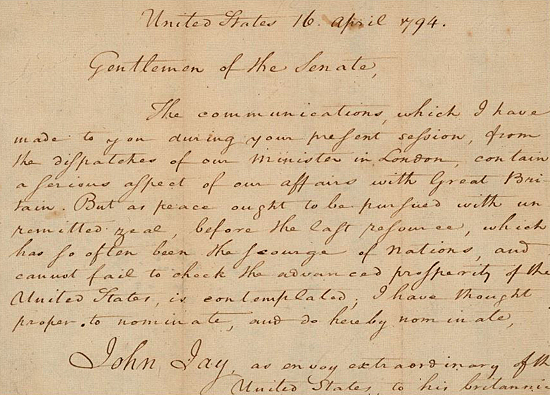
Washington Stating the Reason for Jay's Nomination: Peace With Britain
Jay Treaty — November 19, 1794
Also: Jay's Treaty,
John Jay's Treaty, or Treaty of London
Formally:
Treaty of Amity, Commerce and Navigation
|
|
This is the main article.
Go
here for the
 transcript of
the Jay Treaty.
transcript of
the Jay Treaty.
And here for its official
 appendix.
appendix.
|
Image Above
President George
Washington's nomination of John Jay as Envoy
Extraordinary to his Britannic Majesty, April
16, 1794:
"But as peace
ought to
be pursued with unremitted* zeal [...] I have
thought proper to nominate John Jay, as envoy
extraordinary from the United States to his
Britannic majesty."
* unremitted =
without remission; incessant
Why Was the
Jay Treaty Negotiated in the First Place?
The United States wanted Great Britain to:
:: Evacuate British military
presence in the
 Old Northwest, which
was officially U.S. territory since 1783.
Old Northwest, which
was officially U.S. territory since 1783.
:: Stop
 impressment.
impressment.
:: Stop
the confiscation of American ships and their cargo.
::
Guarantee free international trade.
::
Return abducted slaves.
Great Britain wanted the United States to:
:: Allow British debt collectors
to go after pre-revolutionary debts.
::
Return confiscated property to their
pro-British (Loyalists, Americans who sided
with Great Britain during the war) owners.
Does any of this sound familiar?
Yes,
almost exactly the same issues had been
dealt with eleven years prior in
the
 Treaty of Paris 1783.
Treaty of Paris 1783.
The more recent
grievances regarding international trade and
navigation stemmed from the war between France
and Britain, which commenced on February 1,
1793. (See
 French Revolutionary Wars)
French Revolutionary Wars)
The U.S. was happy
to trade with both nations, but Britain targeted
neutral American ships that carried cargo to
France or French territories.
(See
 British Order-in-Council
of June 8, 1793, and
British Order-in-Council
of June 8, 1793, and
 November 6, 1793)
November 6, 1793)
What Was
Washington's Pickle?
On February 1, 1793, France
declared war on Great Britain and the United Provinces.
 Check this event in the timeline of the French
Revolutionary Wars
Check this event in the timeline of the French
Revolutionary Wars
Pro-British Americans (such as Secretary of the Treasury
 Alexander
Hamilton) and pro-French Americans (such as Secretary of State
Alexander
Hamilton) and pro-French Americans (such as Secretary of State
 Thomas
Jefferson) urged Washington to take action according to
their respective political preferences.
Thomas
Jefferson) urged Washington to take action according to
their respective political preferences.
However, the United States was
 officially neutral. Moreover, as a fledgling nation, the
United States' political and economic independence were
vulnerable, while its military was
still recuperating from the war.
officially neutral. Moreover, as a fledgling nation, the
United States' political and economic independence were
vulnerable, while its military was
still recuperating from the war.
Washington's objective was to continue business with both
Britain and France, while remaining impartial in foreign
politics.
To this end,
Washington sent a diplomat to Great Britain who was
pro-British and pro-peace: Chief Justice John Jay.
Was John Jay the Right Man for the Job?
John Jay was one of the
Founding
Fathers.
Alongside Hamilton and
 Madison, he
wrote the
Federalist Papers
that promoted the ratification of the
Madison, he
wrote the
Federalist Papers
that promoted the ratification of the
 Constitution.
Constitution.
Alongside
 Adams and
Adams and
 Franklin, Jay was part of the 1783
Paris peace committee. He negotiated and signed the
Franklin, Jay was part of the 1783
Paris peace committee. He negotiated and signed the
 Treaty of Paris.
Treaty of Paris.
From 1784 to 1789 Jay was Secretary of Foreign Affairs
(today's Secretary of State.)
In 1789, Washington
made him the first chief justice of the United States Supreme Court.
Yet, Jay's nomination as special envoy was not unopposed.
On Saturday, April 19, 1794, the
U.S. Senate considered the motion,
That
any communications to be made to the Court
of Great Britain may be made through our
Minister now at that Court, with equal
facility and effect, and at much less
expense... and that such an appointment is
at present inexpedient and unnecessary.
That to
permit Judges of the Supreme Court to hold
at the same time any other office or
employment, emanating from and holden at the
pleasure of the Executive, is contrary to
the spirit of the Constitution, and, as
tending to expose them to the influence of
the Executive, is mischievous and impolite.
After this motion passed in the
negative with 10 Yeas and 17 Nays, Senate voted to
agree to Jay's nomination with 18 Yeas and 8 Nays.
Who Signed the
Jay Treaty?
Chief Justice
of the Supreme Court
John Jay
for
the United States
under  President George
Washington
President George
Washington
and
Foreign
Secretary
William Wyndham
Grenville, Lord Grenville
for Great Britain
under King George
III
When Was the
Treaty
Signed and Ratified?
Jay and Grenville signed at
London on November 19, 1794.
The United States ratified the treaty on
August 14, 1795.
Great Britain ratified the
treaty on October 28, 1795.
Ratifications were exchanged at
London on October 28, 1795.
Why the
Delay Between Signing and Ratifying?
The treaty was signed at London and arrived on Edmund Randolph's (Secretary of State) desk in
Philadelphia at 7 p.m. on March 7, 1795. At this time, the
U.S. Senate was not in session.
Why the Senate?
The U.S. Constitution gives the
president power to make treaties if two-thirds of the Senate
agree. In addition, the Senate may amend a treaty or adopt
changes to a treaty.
The Constitution reads,
He shall have
Power, by and with the Advice and Consent of
the Senate, to make Treaties, provided two
thirds of the Senators present concur;
The Senate convened on June 8,
1795, and deliberated for two weeks.
On June 24, 1795, it passed the following resolution of ratification by a vote of 20 to 10,
meaning it just passed with the required two-thirds
majority:
Resolved, two-thirds of the Senate
concurring therein, that they do consent to,
and advise the President of the United
States, to ratify the treaty of amity,
commerce, and navigation, between his
Britannic Majesty and the United States of
America, concluded at London, the 19th day
of November, 1794, on condition that there
be added to the said treaty an article,
whereby it shall be agreed to suspend the
operation of so much of the 12th article, as
respects the trade which his said Majesty
thereby consents may be carried on, between
the United States and his islands in the
West Indies, in the manner, and on the terms
and conditions therein specified.
And the Senate recommend to the President to
proceed, without delay, to further friendly
negotiations with his Majesty, on the
subject of the said trade, and of the terms
and conditions in question.
Washington simply pinned this
 Additional Article to
the treaty, and ratified it on
August 14, 1795.
Additional Article to
the treaty, and ratified it on
August 14, 1795.
Did Britain Have
a Problem With the Additional Article?
No. The U.S. ratified
treaty arrived in London
in October 1795. From London,
 John Quincy Adams
reported on November 14, 1795:
John Quincy Adams
reported on November 14, 1795:
The additional Article, suspending the clause in the twelfth
article according to the ratification of the Senate, was
agreed to without difficulty.
What Was Agreed
Upon in the Jay Treaty?
|
:: |
Britain will have withdrawn all its troops from
U.S. soil by June 1, 1796.
|
|
:: |
Free trade between British and U.S.
territories in North America
|
|
:: |
A
joint survey of the upper Mississippi
River, followed by amicable
negotiations
|
|
:: |
The
 Treaty of
Paris made the St.
Croix River part of the mutual
border. Commissioners will decide
which river that is.
Treaty of
Paris made the St.
Croix River part of the mutual
border. Commissioners will decide
which river that is.
|
|
:: |
The U.S. will compensate British
creditors for losses occasioned by legal
impediments to the collection of debts
contracted prior to 1783.
Commissioners will ascertain how much the U.S.
will have to pay.
|
|
:: |
Maritime claims:
Great Britain will compensate American citizens for illegal captures of their
vessels by British subjects.
The U.S. will compensate British
citizens for illegal captures of
their vessels or merchandize within
their their jurisdiction or by vessels
armed in their ports.
Commissioners will ascertain the
payable amounts.
|
|
:: |
Free trade between British
territories in Europe and the U.S.
|
|
:: |
Limited trade between British
territories in the East Indies and the U.S.
|
|
:: |
Regulations on privateering as well
as on how to proceed when vessels
are captured on suspicion of having
enemy's property or contraband
goods.
|
|
:: |
Subjects or citizens of one party
shall not accept commission from a
foreign state at war with the other.
|
What Did
Washington Think of the Jay Treaty?
George Washington
to Secretary of State, Edmund Randolph, July 22,
1795:
My opinion respecting the treaty, is
the same now that it was: namely, not
favorable to it, but that it is better to
ratify it in the manner the Senate have
advised (and with the reservation already
mentioned), than to suffer matters to remain
as they are, unsettled.
Implementation
and Debate About Treaty Power
On February 29, 1796, President
Washington proclaimed the Jay Treaty in effect.
On March 1, 1796,
he forwarded it to Congress for legislative
implementation.
In other words,
implementing the treaty required money, and according to the U.S.
Constitution, Section 9,
No
Money shall be drawn from the Treasury, but
in Consequence of Appropriations made by
Law;
Thus, the House of Representatives began debate on the appropriation bill
on March 2, 1796.
At least that was
the plan. The Constitution
was brand-new, and nearly no precedence at all
could be referred to, so the debate immediately
shifted towards the extend of treaty power.
If the House
has to decide whether to accept or reject an appropriation
bill, shouldn't the House be authorized to
review instructions presented to the
negotiator and other relevant papers and
notes?
If treaties
are considered "law," wouldn't it follow
that the House is required to pass their appropriation bills,
and that it would be actually against the
law not to do so?
How can the
president conduct meaningful negotiations if
there's a chance that the House will refuse
the allocation of funds necessary for a
treaty's execution?
These were the
Debates in the House of Representatives of the
United States, During the First Session of the
Fourth Congress Upon the Constitutional Powers
of the House with Repect to Treaties (Philadelphia: Printed for
Benj. Franklin Bache by Bioren & Madan,
1796), which have been made accessible online by multiple
sources.
Finally, the debate shifted back to the
appropriation bill at hand, and on April 30,
1796, it passed by a whisker, with a vote of 51 to 48.
Was the Jay
Treaty Good or Bad for the U.S.?
Although the Jay Treaty was wildly
unpopular, it achieved Washington's main objective — it calmed Anglo-American
relations.
At least for now. For the next
clash see the
 War of 1812.
War of 1812.
But in the meantime, the
U.S. economy benefited enormously from the continued
peace with Britain.
In Donald R. Hickey's The War
of 1812, he points out that the Jay Treaty ...
... allowed
American commerce — and hence the American
economy — to flourish. American exports,
which stood at $33 million in 1794, soared
to $94 million in 1801, and the entire
nation basked in the resulting prosperity.
But was that enough?
 Impressment, for example, was
not addressed by the treaty, and became a major issue within
a decade.
(See
Impressment, for example, was
not addressed by the treaty, and became a major issue within
a decade.
(See  Why Was the War of 1812 Fought?)
Why Was the War of 1812 Fought?)
And the French, of course, were completely
miffed.
After having signed a military as well
as a commercial treaty with the U.S. in 1778, and helping the Americans
win their Revolution, the Jay Treaty was more than a slap in
the French face.
Consequently, the French
confiscated American merchant ships, which caused financial
loss in the millions, and the undeclared
 Quasi War
was fought from 1798 to 1800.
Quasi War
was fought from 1798 to 1800.
Controversy: Why Didn't Jay Come Home With a
Better Treaty?
So, why wasn't John Jay able to
negotiate a stronger treaty, a treaty more favorable to the
United States?
Two reasons:
One, Britain was at war with
revolutionary France, which not only threatened an invasion,
but also to radically turn traditional British values
upside down. Britain, therefore, had bigger worries than
maintaining amicable ties with the U.S., a rather
weak military power at the time. In other words, the
United States wanted something from Britain, not the other
way round, which made for a weak bargaining position.
Two, pro-British Secretary of the Treasury Alexander
Hamilton assured British Minister to the United
States, George Hammond, that the
United States would not join European powers in an armed
neutrality against Britain. Hamilton's angle? Trade with Britain
takes priority over friendly connections with France. This
meddling effectively rendered one of Jay's "or else" arguments moot.
All things considered, the
U.S. came out with a pretty good treaty.
Arguing against the above is:
One, while it is true that
Britain had bigger worries, it certainly wasn't keen on
adding yet another enemy. Britain would have been interested in an amicable
treaty with the U.S.
Two, the U.S. joining the
European armed neutrality was not really a concern of
the British, whose maritime power was superior and far from
exhausted. The U.S. navy was weak, and joining the European
armed neutrality would have been a logistical nightmare for
the States.
So far the Jay Treaty controversy.
How was the Jay Treaty received
in the States?
Outrage
Back in the U.S., pro-French citizens and
politicians were scandalized alike. Francophile Jefferson called
the Jay Treaty "a
millstone round our necks."
And speaking of necks...
In his book Presidential
Courage - Brave Leaders and How They Changed America,
Michael R. Beschloss notes,
The
protest was spreading. When Hamilton
defended Jay's Treaty in front of New York's
City Hall, people threw rocks, leaving his
face bloody. [...] In Boston Harbor, mobs
set a British ship aflame.
In Philadelphia, they cried, "Kick this
damned treaty to hell!"
Spearing a copy of Jay's pact with a sharp
pole, the revelers marched it to Minister
Hammond's house, burned it on his doorstep
and broke his windows, with Hammond and his
family cowering inside.
Thomas
Jefferson had not seen the American "public
pulse beat so full" on "any subject since
the Declaration of Independence."
Furthermore, in several
cities, public frustration was communicated by burning effigies of John Jay.
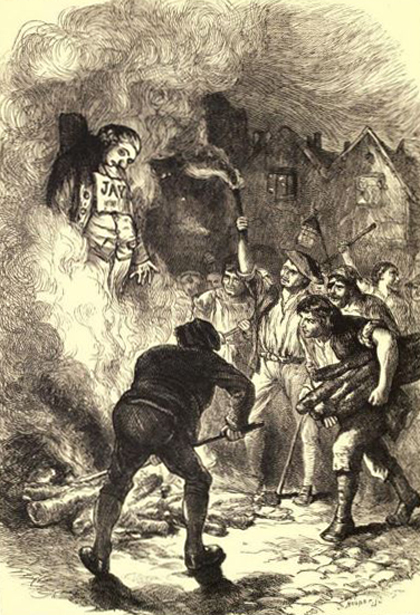
Burning Jay's Effigy
Cassell's
History of the United States by Edmund Ollier
Vol. II, Cassell, Petter & Galpin
Was all this outrage justified?
On October 5,
1795, John Quincy Adams wrote that,
The
treatment of Mr. Jay is certainly such as
does no honor to the American name.
It
appears to me evident enough, that very
little of the outcry of which the treaty is
made the pretence is meant to bear against
that instrument.
There
is a combination of personal envy of the
man, of factious enmity against the
government, and of eternal foreign influence
operating unseen, all assuming the mark of
pure and exalted patriotism, to impose upon
the people; that the mask should be assumed
is neither new nor strange; but that it
should still answer its purpose would be
surprising, if any thing could surprise.
Arbitration
The three Jay Treaty Commissions
marked the birth of modern international arbitration.
The St. Croix River Commission
(Article V) was a success. On October 25, 1798, it
proclaimed the northern branch of the Schoodiac River as the
official border. By doing so, the commissioners not only
ended years of bickering with a final decision, but also
with a compromise. Which might or might not have been their
job. But it sure solved the issue.
This commission had three
commissioners: Thomas Barclay for Britain, David Howell for
the U.S., and Egbert Benson.
The British Debts Commission
(Article VI) was a fiasco due to the fact that the fifth
commissioner voted 100% pro-Britain. On January 8, 1802,
Great Britain
and the United States annulled Article VI of the Jay Treaty, and
Britain accepted a lump sum of £600,000.
This commission had five
commissioners: Thomas Macdonald and Henry Pye Rich for
Britain, Thomas Fitzsimons and James Innes (died and
replaced by Samuel Sitgreaves) for the U.S., and John
Guillemard.
The Maritime Commission
(Articles VII and VIII) was a success. They were done on
February 24, 1804, having awarded American claimants a total
of $11,650,000, and British claimants a total of
$143,428.14.
This commission had five
commissioners: John Nicholl and John Antsey for Britain,
Christopher Gore and William Pinkney for the U.S., and John
Trumbull.
Read more in Richard B. Lillich's
 The Jay Treaty Commissions.
The Jay Treaty Commissions.
Is the Jay
Treaty Still in Force?
Yes, it is. At least part of it.
Here is a peek into
A List of Treaties and
Other International
Agreements of the
United States in Force
on January 1, 2013, provided by the United States Department of State.
This publication lists treaties and other international
agreements of the United States on record in the
Department of State on January 1, 2013, which had not
expired by their own terms or which had not been
denounced by the parties, replaced, superseded by other
agreements, or otherwise definitely terminated.
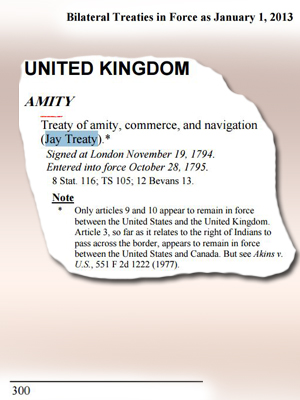
The Note reads: "Only articles 9 and 10 appear to remain in force
between the United States and the United
Kingdom. Article 3, so far as it relates to the
right of Indians to pass across the border,
appears to remain in force between the United
States and Canada."
And here you can check
 all treaties currently in force**.
all treaties currently in force**.
** (archived content 2010)
Jay Treaty
Trivia
::
Original Copy
The Department of
State does not have a signed original of the Jay Treaty in
its archives.
Washington sent
Britain a ratified original, but at the exchange
of ratifications, Britain gave back their
ratification on a lousy copy. See more in
 Hunter Miller's Notes
from Avalon.
Hunter Miller's Notes
from Avalon.
:: Additional Article
The date of the additional article
is not May 4, 1796.
The additional
article was recited textually in each
instrument of ratification, but was not
otherwise drawn up or signed; in 8 Statutes
at Large, 130, the date thereof is given
erroneously as May 4, 1796.
Again, more from the same
 Hunter Miller.
Hunter Miller.
Maps
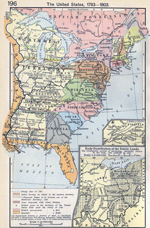
1783-1803
United States
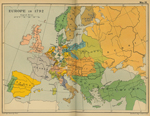
1792 Europe
More History
|